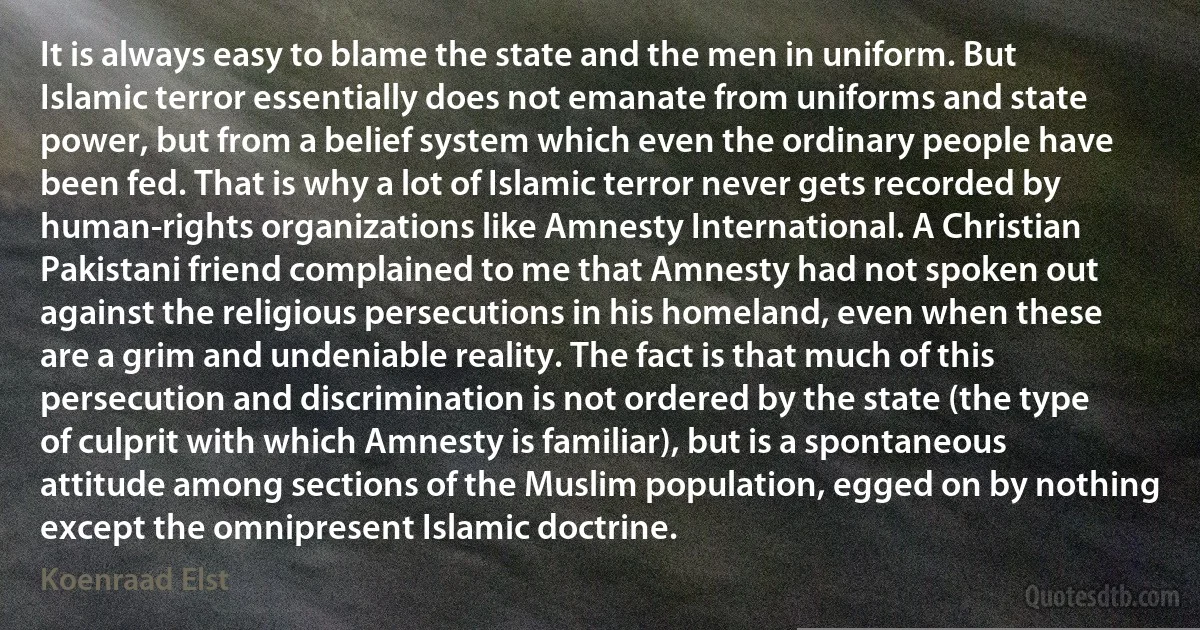
It is always easy to blame the state and the men in uniform. But Islamic terror essentially does not emanate from uniforms and state power, but from a belief system which even the ordinary people have been fed. That is why a lot of Islamic terror never gets recorded by human-rights organizations like Amnesty International. A Christian Pakistani friend complained to me that Amnesty had not spoken out against the religious persecutions in his homeland, even when these are a grim and undeniable reality. The fact is that much of this persecution and discrimination is not ordered by the state (the type of culprit with which Amnesty is familiar), but is a spontaneous attitude among sections of the Muslim population, egged on by nothing except the omnipresent Islamic doctrine.
Koenraad ElstRelated topics
amnesty blame christian culprit discrimination doctrine easy fed friend international men nothing people persecution power speak state pakistani islamicRelated quotes
I well remember receiving from one of the most earnest of my seniors the friendly warning that it was waste of time to study variation, for "Darwin had swept the field." Parenthetically we may notice that though scientific opinion in general became rapidly converted to the doctrine of pure selection, there was one remarkable exception. Systematists for the most part kept aloof. Everyone was convinced that natural selection operating in a continuously varying population was a sufficient account of the origin of species except the one class of scientific workers whose labours familiarised them with the phenomenon of specific difference. From that time the systematists became, as they still in great measure remain, a class apart.

William Bateson
When it's claimed, as it was last week on British television, that Muslims in Britain are victims of British intolerance - yeah right, 1600 mosques worth of intolerance so far, and still building - I think the truth is that, if they are victims of anything, it's Muslim intolerance, because if you are an ordinary Muslim, then surely the last thing you need is a bunch of Islamists speaking for you, because everything they do and say reflects back on you. When they try to force unwanted Islamic values into our education system, for example, or when one of their representatives crudely insults this country by comparing it with Nazi Germany, that reflects on all Muslims, because these people speak for all Muslims. Don't they? No? Well maybe somebody should tell them that.

Pat Condell
An attempt to improve intergroup relations has to face a wide variety of tasks. It deals with problems of attitude and stereotypes in regard to other groups and to one's own group, with problems of development of attitudes and conduct during childhood and adolescence, with problems of housing, and the change of the legal structure of the community; it deals with problems of status and caste, with problems of economic discrimination, with political leadership and with leadership in many aspects of community life. It deals with the small social body of a family, a club or a friendship group, with the larger social body of a school or a school system, with neighborhoods and with social bodies of the size of a community, of the state, a nation and with international problems.

Kurt Lewin
But it will always be impossible to harmonize justice and war. It is always possible to purchase materials with money, but patriotism can not be purchased. Unless the people are willing to defend their country because of their belief in it, because of their affection for it, and because it is representative of their home, their country can not be defended. If we are looking for a more complete reign of justice, a more complete supremacy of law, a more complete social harmony, we must seek it in the paths of peace. Progress in these directions under the present order of the world is not likely to be made except during a state of domestic and international tranquility. One of the great questions before the nations to-day is how to promote such tranquility.

Calvin Coolidge
About belief or lack of belief in an afterlife: Some of you may know that I am neither Christian nor Jewish nor Buddhist, nor a conventionally religious person of any sort.
I am a humanist, which means, in part, that I have tried to behave decently without any expectation of rewards or punishments after I'm dead. My German-American ancestors, the earliest of whom settled in our Middle West about the time of our Civil War, called themselves "Freethinkers," which is the same sort of thing. My great grandfather Clemens Vonnegut wrote, for example, "If what Jesus said was good, what can it matter whether he was God or not?"
I myself have written, "If it weren't for the message of mercy and pity in Jesus' Sermon on the Mount, I wouldn't want to be a human being. I would just as soon be a rattlesnake."

Kurt Vonnegut
